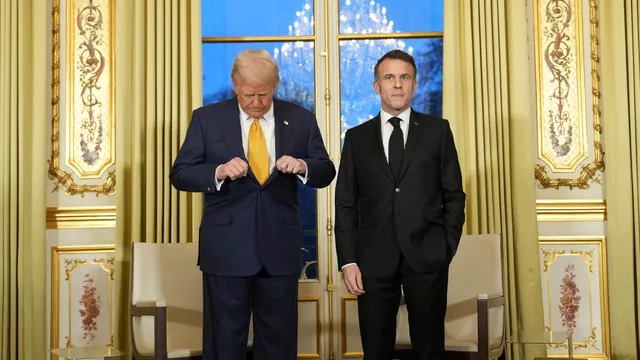
Trump criticizes Macron over G7 summit remarks
2025-06-18 04:57- Trump indicated he would leave the G7 summit early to focus on Middle East negotiations, citing urgency.
- Macron expressed support for Trump's efforts but faced backlash from Trump for his comments.
- The incident highlighted rising tensions in US-France relations and the challenges of international diplomacy.
Express your sentiment!
Insights
At the G7 summit held in Canada, Donald Trump announced his intention to leave a day earlier than scheduled due to urgent matters related to negotiating a ceasefire in the Middle East. Originally, he was expected to remain until late on Tuesday, but he indicated his departure just after noon on Monday. Before Trump's exit, he and other leaders had to revise the wording of their collective statement because Trump had expressed reluctance to sign it unless changes were made. This situation left the remaining leaders feeling pressured to maintain a unified stance. Following Trump's announcement, French President Emmanuel Macron stated that Trump had earlier mentioned ongoing talks for a ceasefire and expressed support for these efforts, asserting it would be very beneficial if the United States could successfully broker such an agreement. Despite this supportive sentiment, Trump publicly dismissed Macron's interpretation of events, labeling him as "publicity-seeking" and asserting that Macron regularly "gets it wrong". The fallout from this incident highlighted the growing tensions between the United States and France, particularly under Trump's administration. Macron's comments, intended to show solidarity and optimism, were rebuffed by Trump, aggravating the delicate relationship between the two nations amid significant global discussions on various pressing issues. This incident at the G7 summit not only showcased Trump's erratic approach to international diplomacy but also reflected the challenges that other world leaders face in navigating relations with his administration. The abrupt decision by Trump to exit early raised eyebrows and sparked discussions among global leaders about the future of such summits, especially considering the role of the United States in pivotal international negotiations, such as those concerning peace in the Middle East. Ultimately, this turbulent event at the G7 summit served to underscore the complicated dynamics present in international relations during Trump's presidency, signaling that communications between leaders might often be fraught with misinterpretation and misunderstanding, leading to a lack of trust and coordination in addressing global problems.
Contexts
The history of G7 summit interactions represents a significant convergence of the world's leading industrialized democracies, providing a platform for coordinated responses to global challenges. Established in the mid-1970s, primarily in response to the oil crisis and economic turmoil, the Group of Seven (G7) includes Canada, France, Germany, Italy, Japan, the United Kingdom, and the United States, with the European Union participating as a non-enumerated member. Over the years, the G7 has acted as an informal forum where leaders can discuss and strategize on economic policy, trade, security, climate change, and public health issues among other key global priorities. The first summit in 1975 laid the groundwork for future meetings, emphasizing the importance of collaboration in addressing shared economic concerns in a rapidly changing global economy. Throughout its evolution, G7 summit interactions have reflected the shifting dynamics of global power and the emergence of new issues that require collective attention. Initially focused on economic conditions, the agenda expanded in the 1980s with the inclusion of political discourse, touching upon the Cold War's influence on international relations. In the following decades, the summit adapted to various global crises, such as the Gulf War in 1990, the Asian financial crisis in 1997, and the 2008 global financial crisis, during which coordinated fiscal and monetary responses were crucial. The interactions at these summits have not only addressed immediate crises but have also shaped long-term strategies for tackling international challenges, including sustainable development and poverty alleviation. An important feature of G7 interactions is the informal and consensus-driven nature of its decision-making process, which allows for open dialogue but often leads to critiques regarding the effectiveness and accountability of outcomes. Critics argue that the G7's informal structure can limit the implementation of its resolutions, leading to questions of legitimacy, especially in an increasingly multipolar world characterized by the rise of emerging economies. As a response, the G7 has sought to engage with other global forums, including the G20, which encompasses a broader range of nations, reflecting a changing geopolitical landscape. This evolution has sometimes led to tensions within the G7, as different member states may prioritize distinct national interests while striving for unified action on global matters. Looking ahead, the G7 faces significant challenges in maintaining its relevance amid growing global interconnectedness and the emergence of new powers. Climate change, pandemics, and international trade disputes represent critical areas that require cohesive action from G7 leaders. The aftermath of the COVID-19 pandemic has further underscored the importance of global cooperation and coordination in public health while challenging existing economic paradigms. As the world continues to evolve, the G7's historical interaction provides a crucial lens on how collective action has evolved in response to both immediate and long-term challenges, making it essential for future frameworks of global governance.